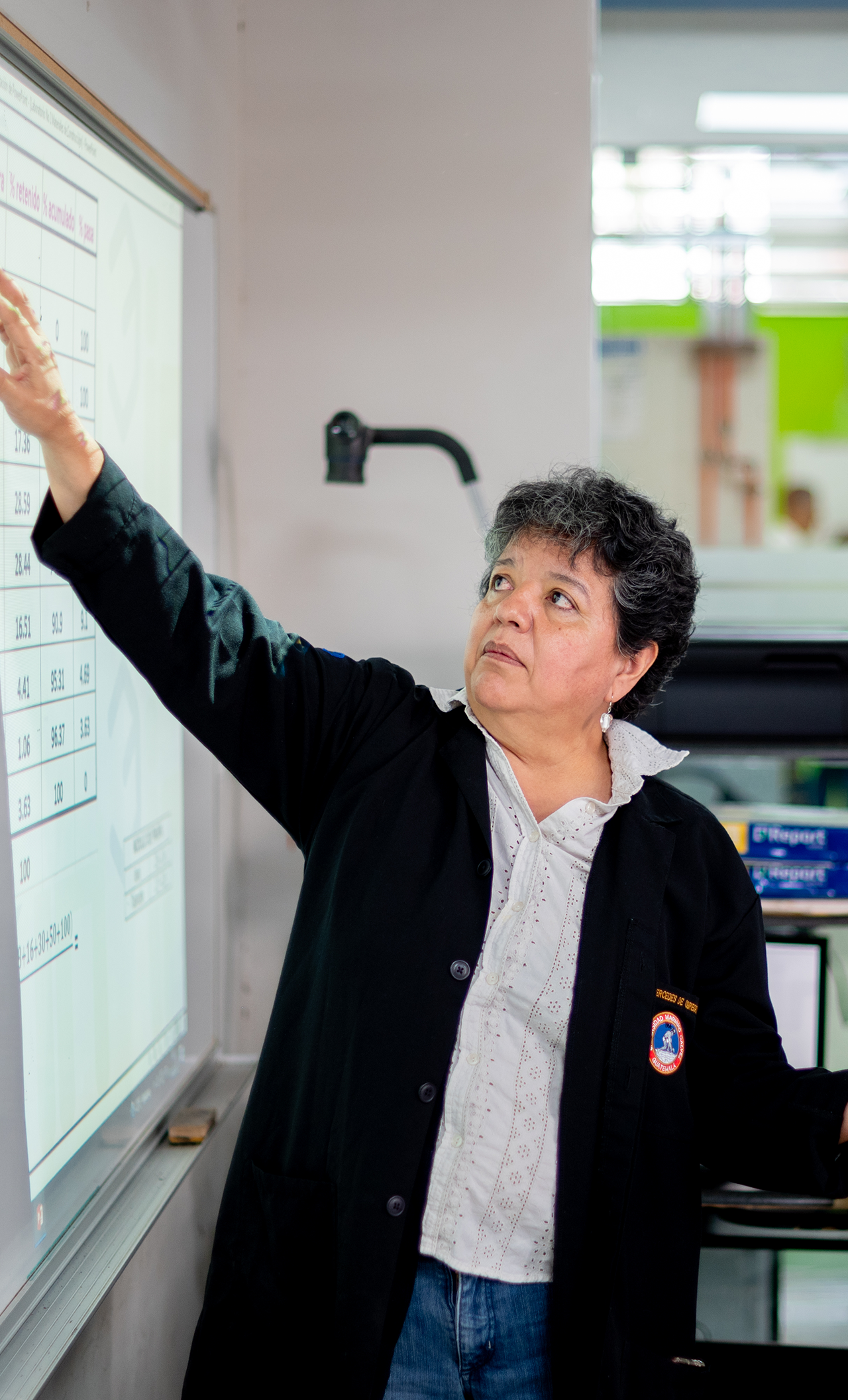
- Bachelor's Degree in
- Electronic Engineering
- Degree to be obtained
- Bachelor's Degree in Electronic Engineering
- Academic degree
- Bachelor's Degree
- Duration
- 5 and a half years
- Modality
- In-person and virtual
- Schedule:
- Daily Morning and afternoon sessions
- Career description
-
To develop a professional in the area of Electronic Engineering with a solid scientific and technological base that allows them to research, analyze, design, build, adapt and appropriate technologies, as well as carry out assemblies, manage and improve processes involving electronic devices and systems in plants and production centers. This in order to cultivate their creative spirit and instil a scientific and critical attitude that allows them to carry out their activities in an effective and responsible manner, in line with the needs and challenges of the national reality.
- What will you learn during the program?
-
To train in theory and practice an orientation for the design of electronic systems and their applications.
Gallery
AdmissionProfile
- Possess a general knowledge of the field of electronic engineering and have an inclination for it.
- The aspiring electronic engineer should be a person with knowledge and skills in the physical and mathematical sciences.
- They should have the skills and knowledge to communicate orally and in writing in a satisfactory manner.
- They must have a general knowledge of national and international social problems.
- Must possess sensitivity, creativity and social commitment.
- Must have the ability to solve problems.
Graduate'sProfile
- Designs, analyses and builds electronic equipment and/or systems to solve problems.
- Simulates models that allow predicting the behavior of electronic systems using computational platforms.
- Designs and solves problems in the productive sector by means of automation, instrumentation and control.
- Designs and implements analogue and digital communication systems.
- Develops and manages research and/or technological development projects.
- Plans, organizes, direct and control activities of installation, updating, operation and maintenance of electronic equipment and/or systems.
Career Opportunities

Analysis, design and development of electronic systems. Industrial automation. Electronic communications.
Curriculum
| 1° Ciclo | ÁLGEBRA SUPERIOR | DESARROLLO HUMANO Y PROFESIONAL | GEOMETRÍA PLANA Y DEL ESPACIO | PROGRAMACIÓN PARA LA CIENCIA E INGENIERÍA I | QUÍMICA INORGÁNICA I |
|---|---|---|---|---|---|
| 2° Ciclo | ALGEBRA LINEAL I | CÁLCULO I | HISTORIA Y COMUNICACIÓN CIENTÍFICA | PROGRAMACIÓN PARA LA CIENCIA E INGENIERÍA II | QUÍMICA INORGÁNICA II |
| 3° Ciclo | ALGEBRA LINEAL II | CÁLCULO II | DIBUJO ASISTIDO POR COMPUTADORA | ESTADÍSTICA Y PROBABILIDAD PARA LA CIENCIA E INGENIERÍA | FÍSICA I |
| 4° Ciclo | CÁLCULO VECTORIAL Y MULTIVARIABLE | ECOLOGÍA Y SOSTENIBILIDAD AMBIENTAL | ECUACIONES DIFERENCIALES ORDINARIAS | ESTADÍSTICA INFERENCIAL | FÍSICA II |
| 5° Ciclo | ANÁLISIS DE VARIABLE COMPLEJA | ECUACIONES DIFERENCIALES PARCIALES | FÍSICA III | LEGISLACIÓN PARA INGENIEROS | PROCESOS ESTOCÁSTICOS |
| 6° Ciclo | ANÁLISIS NUMÉRICO | CIRCUITOS ELÉCTRICOS I | FÍSICA IV | SEÑALES Y SISTEMAS | TEORÍA ELECTROMAGNÉTICA I |
| 7° Ciclo | CIRCUITOS ELÉCTRICOS II | CONVERSIÓN DE ENERGÍA ELECTROMECÁNICA | ELECTRÓNICA ANALÓGICA | ELECTRÓNICA DIGITAL | TEORÍA ELECTROMAGNÉTICA II |
| 8° Ciclo | MÁQUINAS ELÉCTRICAS | ORGANIZACIÓN DE COMPUTADORAS | REDES DE COMPUTADORAS | SISTEMAS DE CONTROL ANALÓGICO | TEORÍA ELECTROMAGNÉTICA III |
| 9° Ciclo | COMUNICACIONES I | ELECTRÓNICA INDUSTRIAL | INSTALACIONES ELÉCTRICAS | MICROPROCESADORES Y MICROCONTROLADORES | SISTEMAS DE CONTROL DIGITAL |
| 10° Ciclo | COMUNICACIONES II | DISEÑO DE SISTEMAS DIGITALES | INSTRUMENTACIÓN INDUSTRIAL | REDES WAN LAN | RELEVACIÓN INDUSTRIAL |
| 11° Ciclo | AUTOMATIZACIÓN INDUSTRIAL | COMUNICACIONES III | EMPRENDIMIENTO INNOVACIÓN Y PROYECTOS | INGENIERÍA ECONÓMICA | MECATRÓNICA |


